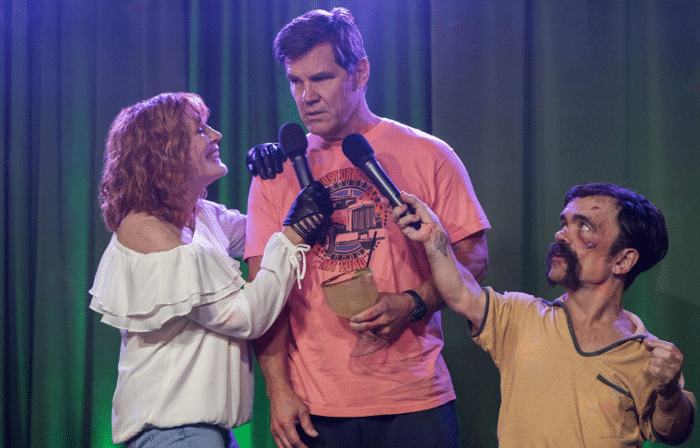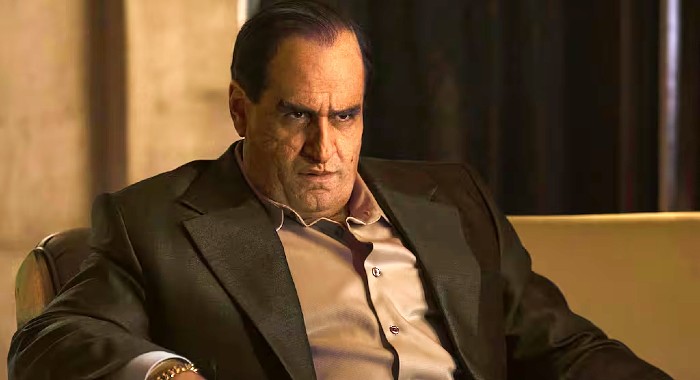

Dear Hollywood: Being Unattractive Is Not Brave
By Kayleigh Donaldson | Film | August 25, 2017 |
By Kayleigh Donaldson | Film | August 25, 2017 |
Set photos from Josie Rourke’s upcoming film, Mary Queen of Scots, made their way to Twitter this week, revealing Margot Robbie in costume for the role of Queen Elizabeth I. It’s a pretty striking resemblance, or at least as close as we can imagine given the sheer glut of performers who have played the role and the little evidence we have of Elizabeth’s appearance. Robbie has the curly red hair with the high hairline, fashionable at the time, and seems to be wearing a prosthetic nose. Make-up has also given her the smallpox scars, which is a detail most Elizabeth focused dramas skip over, so kudos for that. I’m excited for the film, but I’m already dreading the narrative I know will surround Robbie once this film is released. It’s already all over Twitter, as people flock to call her ‘brave’ for going to such lengths for the part. It’s not hard to read between the lines of what makes her so seemingly heroic for doing what is really the bare minimum required to accurately play Elizabeth I: Margot Robbie, they’ll say, is brave because she went ‘ugly.’

Margot Robbie is a beautiful woman and her career has been defined in part because of how the public adores and consumes her particular brand of it. Remember the booty shorts in Suicide Squad? Or that super creepy profile of her in Vanity Fair? Robbie is an immensely charming performer with a magnetic on-screen presence, but the industry has so far struggled to let her show that beyond roles where her attractiveness is the central focus. So, like many before her, Robbie has had to go ‘ugly’ to show how serious she really is. As well as playing Elizabeth, she will soon headline a movie on the life of Tonya Harding. On-set shots of her in a padded outfit with frizzy hair and no make-up were met with proclamations over her stunning ‘transformation’, even though she still looks pretty much like Margot Robbie. The message is clear: Serious equals unattractive, and it’s the metamorphosis that matters.
The industry loves to see the sausage being made. Jokes about Oscar bait are old hat by now but there is still an exhausting level of legitimacy to the tropes of what must be done to win that coveted award. Leonardo Dicaprio went through an extended period of self-flagellation for The Revenant not because it improved his performance but because it created an amazing narrative he could package up to Academy voters. Oh wow, look at how hard he worked, look at the suffering etched on his face, it’s astounding. The method acting deifying has been a key part of Oscar success for a long time, but saw its modern peak with devotees like Daniel Day-Lewis, whose steadfast dedication to staying in character seems almost quaint in the age of Jared Leto pretending sending used anal beads to his fellow cast-members on Suicide Squad counted as rehearsal. Actresses don’t seem as big on the method acting spiel - probably because even trying it would lead to accusations of diva behaviour and bitchiness - but they are still encouraged to embrace a little stunt-work now and then. Why go method when you can wear a prosthetic nose?

A lot of the time, the hype is more egregious than the acting itself. Nicole Kidman is pretty good in The Hours. It’s not her best performance but it got her that Oscar, yet all I remember from that awards season was the hoopla surrounding that fake nose. So much of her work as an actress was seen as being inextricably tied to that nose, as if Kidman was somehow a bad actress up to that point. The excitement was all about the transformation, the sheer nerve of a beautiful woman like Nicole Kidman daring to be kind of plain. When she was announced as the winner of Best Actress, even Denzel Washington got in a reference, joking she won ‘by a nose’ before saying her name.
The most striking example of this from the past twenty years is arguably Charlize Theron’s own Oscar winning turn as serial killer Aileen Wuornos in Monster. Prior to the role, Theron was like Robbie, a stunning actress viewed by most as mere window dressing and shot as such in the films she starred in. Theron certainly put in the work of playing Wuornos, including make-up, weight gain, false teeth and shaving her eyebrows. It was a narrative hand-crafted for the press who couldn’t get over the idea that Theron would ever do such a thing. She too was called ‘brave’, something she found tiring and tried to avoid playing into, but it certainly went a long way to helping her snag that trophy.

All of this is not to say that these performances are bad or somehow unfair because of the necessity to play it plain. Theron is unnerving and striking as Wuornos; Kidman brings an abrasive empathy to Virginia Woolf; Cameron Diaz has never been better than she is in Being John Malkovich. These women are, after all, doing their jobs. The narrative of bravery that follows their creative choices is detrimental to their work, partly because it suggests that they’re incapable of actually acting without it. Great acting is simply accentuated by the right tools.
The problem that sticks with me throughout this charade is how it effects those of us who are actually unattractive women. I’d rate myself a 5 out of 10 on the pretty scale, and I’ve spent years working to completely own that. I refuse to be bothered by a beauty standard I’ll never fit, which is sometimes easier said than done, and it’s taken me a long time to accept that my worth is not rooted in how I look. It’s a level of power I’ve freaking earned, and I don’t think it makes me brave. Honestly, any decision a woman makes to just get by in a world that hates them isn’t something I’m comfortable judging. If make-up works for you, go for it. I don’t wear any and I’m allergic to most of it anyway but I love the artistry of it.
Still, that doesn’t mean that I haven’t been stung by how pop culture, something I follow with ceaseless passion, treats looking like me as a challenge or act of heroism.
I fit a lot of our culture’s increasingly narrow standards of beauty: I’m white, I’m cisgender, I have long blonde hair and blue eyes, my figure is somewhat hourglass shaped, and I tend to dress in a very feminine manner. I also have psoriasis across my face, scalp and body, adult acne and the scarred remnants of adolescent outbreaks on my chin and cheeks, a ridiculous amount of body hair, and a few stretchmarks. If I were in a film, I’d probably be the hideous blind date Adam Sandler has to go no before he can be with Drew Barrymore, or maybe I’d be a really bawdy wench in a bar scene of some Eddie Redmayne starring period drama where he whimpers some more. When Jennifer Aniston worked her butt off to try and get her performance in Cake Oscar nominated (she failed), a lot of attention was paid to her own attempt at ‘going ugly’, which mostly consisted of not washing her face or hair for a bit. As someone cursed with very oily skin and hair, I’m left wondering where the hell my Oscar is.

You’re more likely to see someone who looks like me in a movie than a woman of colour, trans woman or disabled woman since I still have all those levels of privilege, but plain or unattractive women are not given the chance to be transformative on screen unless it’s a cloying Ugly Ducking romance (and even then the plain Janes are still played by Rachael Leigh Cook). Patriarchy shits on us all, but there’s something especially galling about the catch-22 situation it creates for women in Hollywood: We only want the beautiful ones, but we won’t take them seriously until they go ugly.
I think most audiences are savvy enough to know when an actor’s physical transformation into plainness is more in service of vanity than the performance (responses to Matthew McConaughey’s unnecessary work in Gold comes to mind). If a performance is truly wonderful, the make-up or weight gain won’t be the first thing we talk about, or at least it shouldn’t be. All I ask of the world, when Mary Queen of Scots comes out, is that Margot Robbie gets to be an actress and not a beacon of heroism for doing the bare minimum the role requires. Give us ugly girls a little credit.
← Review: Adam Wingard's 'Death Note' | 'Game of Thrones' Season 7 Episode 6 "Beyond The Wall" Deep Dive Recap →
More Like This
Amy Adams Goes Feral in 'Nightbitch'
Demi Moore and Margaret Qualley's 'The Substance' Takes Body Horror to Glittery, Grotesque Heights
Three Trailers: Polymorphic Pattinsons Vs. Bonkers 'Brothers' Brolin and Dinklage
Harvey Weinstein's Back in Court
Netflix's 'Uglies' Is a Disastrous Algorithmic Nightmare

Three Trailers: Polymorphic Pattinsons Vs. Bonkers 'Brothers' Brolin and Dinklage
A New Series Explores the ‘Chaos’ Behind Superhero Franchises
Robert De Niro Couldn't Remember His Lines While Shooting 'Joker'
RFK, Jr. Had an Affair with 31-Year-Old Journalist, Olivia Nuzzi
‘We Live In Time’ Inspired Florence Pugh to Prioritize Her Love Life
Elle King Says Rob Schneider's Apology 'Means Nothing'
Pajiba Love

Where Were You When You Learned About The Penguin's Dong?
Reviews